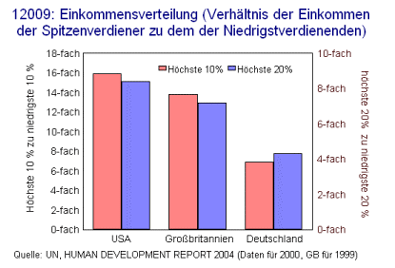I don´t like these antagonistic catchphrases - "capitalism/socialism" - thrown around like they are completely different things. Absolutely no country in the world has a "free market". All states intervene in economic processes in varying degrees.
It´s the transatlantic gap showing again. Europeans would call what you deem "socialism" as "democratic socialism". A seemingly minor difference, but very important to us

.
Is it really what it´s made out to be? I´ll quote The 18th congress of the Socialist International in Stockholm:
A short example on wealth distribution in Europe and the US:
(sorry, in German because I´m too lazy to look up the English versions... I´ll translate)
This graphic shows income distribution in the US, UK and Germany (the nations being on the x-axis). The y-axis shows how much the top10% (pink bar) and the top20% (blue bar) earn in comparison the the lowest-income groups - 2 times as much, 10 times as much, and so on. Data from the UN Human Development Report 2004.

Additionally, in the US, the top20% are in possession of 50% of the nations income.
Their gini value (an indicator for income disparity) is 46,6 / rank 92, while Germany for example has a rating of 28,2 and is ranked 14th.
Here is an interesting graphic from the wiki, showing the different gini values across the world:

Of course, as you may notice, the gini value in itself does not say something about absolute wealth, just relative income disparity. But we know European GDP etc. is quite comparable to the US while maintaining a lower income disparity. If one says ´socialism´ is about ´fair´ (whatever that means) redistribution of wealth, I think it is quite good at it.



 Liberate us!
Liberate us! .
.

 Well done, eh?
Well done, eh? 
